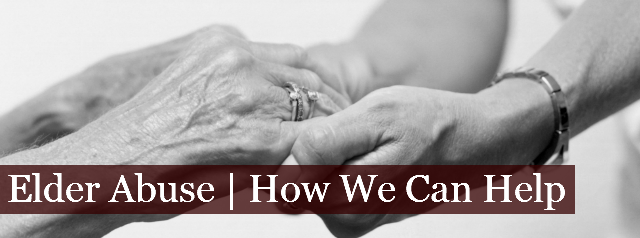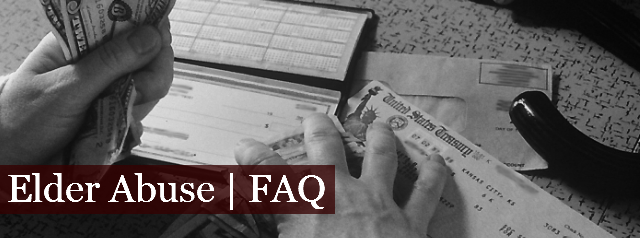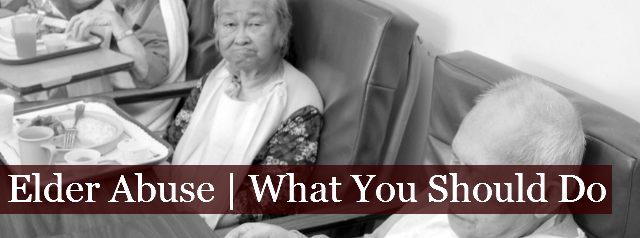Elder Abuse and Nursing Neglect Lawyer San Diego Pursuing Nursing Homes, Residential Care Facilities, Assisted Living Facilities, and Hospitals
Elder abuse and neglect can happen to anyone, regardless of sex, social status or ethnic background. It wears many faces and, alarmingly, typically occurs at the hands of the people who are most trusted by the victims – like their caregivers, nurses and medical personnel (including nursing home and adult residential care facilities). The definition of an “elder” is one who is 65 years or older.
Physical elder abuse and neglect results from nursing homes, residential care facilities, assisted living facilities, and hospitals that often fail to spend and use the resources necessary to care appropriately for your elderly loved ones. This results in untrained and unqualified staff, low staffing ratios, and cutting corners on care and treatment. The bottom line is, this is negligence. Our elderly loved ones who suffer falls, injuries, pressure sores, and other unfortunate incidents, are often times being negligently cared for.
Nursing Home Abuse and Neglect – Elder Abuse and Neglect – What are the signs?
- Bedsores and pressure sores;
- Failure to provide adequate nutrition;
- Improper health care;
- Wandering;
- Lack of attention; or
- Lack of assistance.
- Other signs of elder abuse might be more apparent when observing relationships between elders and their caregivers.
Questions to Consider about the Nurses or Caregiver:
- Does the nurse or caregiver respond to the elder’s requests and concerns?
- Does the nurse or caregiver seem to express more concern about the elder’s finances than about his or her physical and/or mental health?
- Has the nurse or caregiver isolated the elder, or does the nurse/caregiver prevent the elder from interacting with friends or family members unless the nurse/caregiver is present?
Any of these warning signs – alone or combined – may suggest the elder has fallen victim to neglect, abuse or financial exploitation.
Personal Injury – Elder Abuse and Neglect – What is Required of the Facility?
Nursing homes in San Diego are regulated by law. To be eligible for Medicare and Medicaid reimbursement, the facilities must meet staffing and other requirements that are designed to protect the elderly. Abuse and neglect of the elderly is often the result of deliberate understaffing by a facility, in violation of law. Audits are conducted regularly to ensure that the elderly are properly cared for in these facilities. These audits are often invaluable in exposing a defendant who has repeatedly violated the law as it relates to the humane and proper care of elderly people.
Elder abuse and neglect is a serious and growing problem, especially with the baby boom generation entering retirement. In recognition of this problem, California has a unique law providing enhanced protections against elder abuse.
Personal Injury – Elder Abuse – What Can Be Done?
When you or a loved one is injured or taken advantage of, emotions understandably run high. The well being of the victim is of the upmost importance to our firm. Fraud, medical bills, lost income, emotional distress and a variety of other damages are generally at issue when one suffers an injury.
Justice Law Group of San Diego and Los Angeles provides you with a free evaluation to identify your damages as well as potential assets to aid in recovery. We will deploy investigators when necessary and use our legal experience to properly assess your claim. When an injury occurs there are many important steps to take, from deciding whether to initiate a lawsuit to evaluating your damages and properly planning your recovery.
Personal Injury and Elder Abuse Attorneys at the Justice Law Group of San Diego and Los Angeles understand the pain and suffering that an injured party endures after being the victim of elder abuse. Seeking the prompt advice of an experienced attorney to discuss the abuse, the avenues for preventing future abuse and the recovery process are key. Don’t wait until it’s too late.
At Justice Law Group of San Diego and Los Angeles we understand the elder abuse laws and how they apply to each client’s particular case. We prepare each case to maximize the value for you before the trier of fact, whether it be a judge, jury, or arbitrator – as well as the insurance companies. If you have been the victim of elder abuse, we will fight to ensure you are fairly compensated and justice is achieved. Contact our San Diego or Los Angeles office today to discuss your case, free of charge and obligation.
How much do we believe in our ability to successfully fight for you? If we take your case, you pay NO ATTORNEYS FEES, unless and until we recover payment for you. At the Justice Law Group of San Diego and Los Angeles, you will not be passed to a secretary or paralegal, instead you will speak to the Personal Injury and elder abuse lawyers in San Diego who will be handling your case all the way through trial when necessary. Call us today. 858.412.0019 or contact@justice-lawgroup.com
Elder Abuse and Neglect – Welfare & Institutions Code § 15610.07
“Abuse of an elder or a dependent adult” means either:
- Physical abuse, neglect, financial abuse, abandonment, isolation, abduction, or other treatment with resulting physical harm or pain or mental suffering.
- The deprivation by a care custodian of goods or services that are necessary to avoid physical harm or mental suffering.
Physical Elder Abuse – Welfare & Institutions Code § 15610.63
“Physical abuse” of an Elder means:
- Assault, as defined in Section 240 of the Penal Code.
- Battery, as defined in Section 242 of the Penal Code.
- Assault with a deadly weapon or force likely to produce great bodily injury, as defined in Section 245 of the Penal Code.
- Unreasonable physical constraint, or prolonged or continual deprivation of food or water.
Sexual Assault of an Elder means:
- Sexual battery, as defined in Section 243.4 of the Penal Code.
- Rape, as defined in Section 261 of the Penal Code.
- Rape in concert, as described in Section 264.1 of the Penal Code.
- Spousal rape, as defined in Section 262 of the Penal Code.
- Incest, as defined in Section 285 of the Penal Code.
- Sodomy, as defined in Section 286 of the Penal Code.
- Oral copulation, as defined in Section 288a of the Penal Code.
- Sexual penetration, as defined in Section 289 of the Penal Code.
- Lewd or lascivious acts as defined in paragraph (2) of subdivision (b) of Section 288 of the Penal Code.
Use of a physical or chemical restraint or psychotropic medication under any of the following conditions:
- For punishment.
- For a period beyond that for which the medication was ordered pursuant to the instructions of a physician and surgeon licensed in the State of California, who is providing medical care to the elder or dependent adult at the time the instructions are given.
- For any purpose not authorized by the physician and surgeon.
Neglect of Elder – Welfare & Institutions Code § 15610.57
Neglect of an elder or dependent adult occurs when a person or entity does any of the following:
- The negligent failure of any person having the care or custody of an elder or a dependent adult to exercise that degree of care that a reasonable person in a like position would exercise.
- The negligent failure of an elder or dependent adult to exercise that degree of self care that a reasonable person in a like position would exercise.
- Neglect includes, but is not limited to, all of the following:
- Failure to assist in personal hygiene, or in the provision of food, clothing, or shelter.
- Failure to provide medical care for physical and mental health needs. No person shall be deemed neglected or abused for the sole reason that he or she voluntarily relies on treatment by spiritual means through prayer alone in lieu of medical treatment.
- Failure to protect from health and safety hazards.
- Failure to prevent malnutrition or dehydration.
- Failure of an elder or dependent adult to satisfy the needs specified in paragraphs (1) to (4), inclusive, for himself or herself as a result of poor cognitive functioning, mental limitation, substance abuse, or chronic poor health.
Financial Elder Abuse – Welfare & Institutions Code § 15610.30
Financial Abuse of an elder or dependent adult occurs when a person or entity does any of the following:
- Takes, secretes, appropriates, obtains, or retains real or personal property of an elder or dependent adult for a wrongful use or with intent to defraud, or both.
- Assists in taking, secreting, appropriating, obtaining, or retaining real or personal property of an elder or dependent adult for a wrongful use or with intent to defraud, or both.
- Takes, secretes, appropriates, obtains, or retains, or assists in taking, secreting, appropriating, obtaining, or retaining, real or personal property of an elder or dependent adult by undue influence, as defined in Section 1575 of the Civil Code.
- A person or entity shall be deemed to have taken, secreted, appropriated, obtained, or retained property for a wrongful use if, among other things, the person or entity takes, secretes, appropriates, obtains, or retains the property and the person or entity knew or should have known that this conduct is likely to be harmful to the elder or dependent adult.
For purposes of this section, a person or entity takes, secretes, appropriates, obtains, or retains real or personal property when an elder or dependent adult is deprived of any property right, including by means of an agreement, donative transfer, or testamentary bequest, regardless of whether the property is held directly or by a representative of an elder or dependent adult.
For purposes of this section, “representative” means a person or entity that is either of the following:
- A conservator, trustee, or other representative of the estate of an elder or dependent adult.
- An attorney-in-fact of an elder or dependent adult who acts within the authority of the power of attorney.
Abandonment Elder Abuse – Welfare & Institutions Code § 15610.05
“Abandonment” means the desertion or willful forsaking of an elder or a dependent adult by anyone having care or custody of that person under circumstances in which a reasonable person would continue to provide care and custody.
Isolation Elder Abuse – Welfare & Institutions Code § 15610.43
“Isolation” means any of the following:
- Acts intentionally committed for the purpose of preventing, and that do serve to prevent, an elder or dependent adult from receiving his or her mail or telephone calls.
- Telling a caller or prospective visitor that an elder or dependent adult is not present, or does not wish to talk with the caller, or does not wish to meet with the visitor where the statement is false, is contrary to the express wishes of the elder or the dependent adult, whether he or she is competent or not, and is made for the purpose of preventing the elder or dependent adult from having contact with family, friends, or concerned persons.
- False imprisonment, as defined in Section 236 of the Penal Code.
- Physical restraint of an elder or dependent adult, for the purpose of preventing the elder or dependent adult from meeting with visitors.
- The acts set forth in subdivision (a) shall be subject to a rebuttable presumption that they do not constitute isolation if they are performed pursuant to the instructions of a physician and surgeon licensed to practice medicine in the state, who is caring for the elder or dependent adult at the time the instructions are given, and who gives the instructions as part of his or her medical care.
- The acts set forth in subdivision (a) shall not constitute isolation if they are performed in response to a reasonably perceived threat of danger to property or physical safety.
Abduction Elder Abuse – Welfare & Institutions Code § 15610.06
“Abduction” means the removal from this state and the restraint from returning to this state, or the restraint from returning to this state, of any elder or dependent adult who does not have the capacity to consent to the removal from this state and the restraint from returning to this state, or the restraint from returning to this state, as well as the removal from this state or the restraint from returning to this state, of any conservatee without the consent of the conservator or the court.
Mental Suffering Elder Abuse – Welfare & Institutions Code § 15610.53
“Mental suffering” means fear, agitation, confusion, severe depression, or other forms of serious emotional distress that is brought about by forms of intimidating behavior, threats, harassment, or by deceptive acts performed or false or misleading statements made with malicious intent to agitate, confuse, frighten, or cause severe depression or serious emotional distress of the elder or dependent adult.





